Items filtered by date: August 2023
Effective Strategies for Managing Bunions
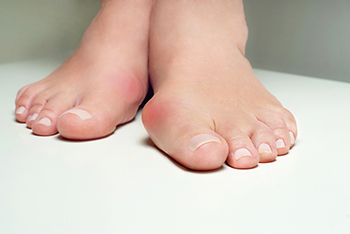
Bunions are bony protrusions at the base of the big toe that can not only be unsightly, but also painful. Managing bunions involves a combination of self care and professional guidance. Begin by wearing well-fitting shoes with ample room for your toes and avoiding high heels and pointy shoes that exacerbate pressure on the bunion. Taking over-the-counter pain relievers can provide temporary relief. Wearing custom orthotic inserts can alleviate discomfort by redistributing pressure. Regularly performing gentle toe stretches and exercises can improve flexibility and strength. In severe cases, surgical intervention may be considered. With a proactive approach, you can successfully manage bunions and maintain your foot health. If the bunion causes persistent pain or interferes with daily activities, it is suggested that you consult a podiatrist who can offer you additional relief and treatment methods.
If you are suffering from bunions, contact Deborah Rosenfeld of Rosenfeld Podiatry. Our doctor can provide the care you need to keep you pain-free and on your feet.
What Is a Bunion?
A bunion is formed of swollen tissue or an enlargement of boney growth, usually located at the base joint of the toe that connects to the foot. The swelling occurs due to the bones in the big toe shifting inward, which impacts the other toes of the foot. This causes the area around the base of the big toe to become inflamed and painful.
Why Do Bunions Form?
Genetics – Susceptibility to bunions are often hereditary
Stress on the feet – Poorly fitted and uncomfortable footwear that places stress on feet, such as heels, can worsen existing bunions
How Are Bunions Diagnosed?
Doctors often perform two tests – blood tests and x-rays – when trying to diagnose bunions, especially in the early stages of development. Blood tests help determine if the foot pain is being caused by something else, such as arthritis, while x-rays provide a clear picture of your bone structure to your doctor.
How Are Bunions Treated?
- Refrain from wearing heels or similar shoes that cause discomfort
- Select wider shoes that can provide more comfort and reduce pain
- Anti-inflammatory and pain management drugs
- Orthotics or foot inserts
- Surgery
If you have any questions, please feel free to contact our office located in Marlton, NJ . We offer the newest diagnostic and treatment technologies for all your foot care needs.
Toe Capsulitis Pain
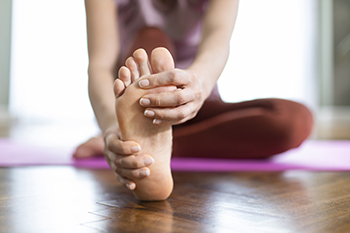
Capsulitis is a painful condition that affects the front part of the foot and can worsen over time. The smaller toes have three joints each. If the pain comes from the ball of the foot, it might indicate capsulitis. This happens when a ligament in the joint becomes inflamed. Capsulitis mainly affects the second toe, sometimes extending to the third toe. Symptoms include pain, swelling, and redness in the front part of the foot. Walking and wearing shoes can be uncomfortable. Neglecting capsulitis can lead to additional problems like calluses and curled toes. It can even cause one toe to cross over another. Capsulitis can result from injuries, poor foot mechanics, ill-fitting shoes, or conditions like arthritis. Some individuals are more susceptible due to their foot structure. Treatment includes resting, wearing shoe inserts, exercising the foot, avoiding tight, thin-soled shoes, and elevating the foot. If you have persisting toe pain, it is suggested that you make an appointment with a podiatrist for care.
Toe pain can disrupt your daily activities. If you have any concerns, contact Deborah Rosenfeld of Rosenfeld Podiatry. Our doctor can provide the care you need to keep you pain-free and on your feet.
What Causes Toe Pain?
Most severe toe pain is caused due to a sports injury, trauma from dropping something heavy on the toe, or bumping into something rigid. Other problems can develop over time for various reasons.
Toe pain can be caused by one or more ailments. The most common include:
- Trauma
- Sports injury
- Wearing shoes that are too tight
- Arthritis
- Gout
- Corns and calluses
- Hammertoe
- Bunions
- Blisters
- Ingrown toenails
- Sprains
- Fractures (broken bones)
- Dislocations
When to See a Podiatrist
- Severe pain
- Persistent pain that lasts more than a week
- Signs of infection
- Continued swelling
- Pain that prevents walking
Diagnosis
In many cases the cause of toe pain is obvious, but in others, a podiatrist may want to use more advanced methods to determine the problem. These can range from simple visual inspections and sensation tests to X-rays and MRI scans. Prior medical history, family medical history, and any recent physical traumatic events will all be taken into consideration for a proper diagnosis.
Treatment
Treatments for toe pain and injuries vary and may include shoe inserts, padding, taping, medicines, injections, and in some cases, surgery. If you believe that you have broken a toe, please see a podiatrist as soon as possible.
If you have any questions please feel free to contact our office located in Marlton, NJ . We offer the newest diagnostic tools and technology to treat your foot and ankle needs.
Plantar Warts and Possible Treatments
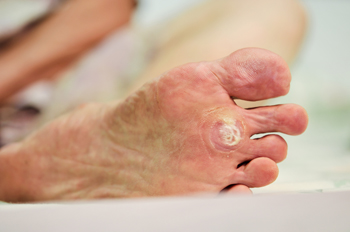
Plantar warts are benign skin growths that appear on the soles of the feet caused by the human papillomavirus. These warts can be painful and discomforting, often characterized by small, grainy bumps with black dots in the center. The virus enters the skin through small cuts or abrasions and thrive in warm, moist environments like public showers and swimming pools. While plantar warts are generally harmless, they can be stubborn and challenging to eliminate without proper treatment. Over-the-counter remedies such as salicylic acid or freezing solutions may provide some relief but professional interventions that can include cryotherapy, laser therapy, or surgical removal may be necessary for complete eradication. To prevent plantar warts, it's crucial to maintain good foot hygiene, wear protective footwear in public areas, and avoid sharing personal items with others. If you have developed a plantar wart, it is suggested that you visit a podiatrist who can offer effective treatment options.
Plantar warts can be very uncomfortable. If you need your feet checked, contact Deborah Rosenfeld from Rosenfeld Podiatry. Our doctor will assist you with all of your foot and ankle needs.
About Plantar Warts
Plantar warts are the result of HPV, or human papillomavirus, getting into open wounds on the feet. They are mostly found on the heels or balls of the feet.
While plantar warts are generally harmless, those experiencing excessive pain or those suffering from diabetes or a compromised immune system require immediate medical care. Plantar warts are easily diagnosed, usually through scraping off a bit of rough skin or by getting a biopsy.
Symptoms
- Lesions on the bottom of your feet, usually rough and grainy
- Hard or thick callused spots
- Wart seeds, which are small clotted blood vessels that look like little black spots
- Pain, discomfort, or tenderness of your feet when walking or standing
Treatment
- Freezing
- Electric tool removal
- Laser Treatment
- Topical Creams (prescription only)
- Over-the-counter medications
To help prevent developing plantar warts, avoid walking barefoot over abrasive surfaces that can cause cuts or wounds for HPV to get into. Avoiding direct contact with other warts, as well as not picking or rubbing existing warts, can help prevent the further spread of plantar warts. However, if you think you have developed plantar warts, speak to your podiatrist. He or she can diagnose the warts on your feet and recommend the appropriate treatment options.
If you have any questions please feel free to contact our office located in Marlton, NJ . We offer the newest diagnostic and treatment technologies for all your foot and ankle needs.
How to Handle Hammertoe
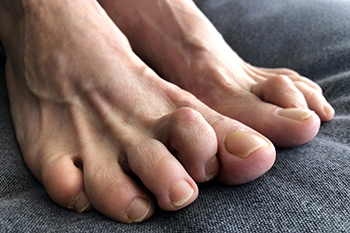
Hammertoe is a common foot condition where one or more toes become bent at the middle joint resembling a hammer. Although it can be uncomfortable and limit footwear choices, there are effective measures to be implemented that can help manage this condition. The first step is to wear shoes that have adequate room for the toes to move freely. It is helpful if the shoes can accommodate bent toes and high heels and pointy-toed shoes should be avoided. Many patients find it beneficial to perform toe exercises that help to improve flexibility and alleviate pain. Temporary relief may occur when orthotic inserts are worn or cushioned pads are placed over the affected toes. Early intervention and consistent foot care are essential for treating and managing hammertoe, improving mobility, and restoring foot comfort and confidence. If you are afflicted with hammertoe, it is suggested that you are under the care of a podiatrist who can help you effectively manage this condition.
Hammertoe
Hammertoes can be a painful condition to live with. For more information, contact Deborah Rosenfeld from Rosenfeld Podiatry. Our doctor will answer any of your foot- and ankle-related questions.
Hammertoe is a foot deformity that affects the joints of the second, third, fourth, or fifth toes of your feet. It is a painful foot condition in which these toes curl and arch up, which can often lead to pain when wearing footwear.
Symptoms
- Pain in the affected toes
- Development of corns or calluses due to friction
- Inflammation
- Redness
- Contracture of the toes
Causes
Genetics – People who are genetically predisposed to hammertoe are often more susceptible
Arthritis – Because arthritis affects the joints in your toes, further deformities stemming from arthritis can occur
Trauma – Direct trauma to the toes could potentially lead to hammertoe
Ill-fitting shoes – Undue pressure on the front of the toes from ill-fitting shoes can potentially lead to the development of hammertoe
Treatment
Orthotics – Custom made inserts can be used to help relieve pressure placed on the toes and therefore relieve some of the pain associated with it
Medications – Oral medications such as anti-inflammatories or NSAIDs could be used to treat the pain and inflammation hammertoes causes. Injections of corticosteroids are also sometimes used
Surgery – In more severe cases where the hammertoes have become more rigid, foot surgery is a potential option
If you have any questions please contact our office located in Marlton, NJ . We offer the newest diagnostic and treatment technologies for all your foot and ankle needs.
Heel Pain Can Be Treated!
What Causes Plantar Fasciitis?
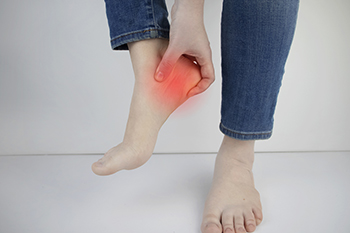
The most common cause of heel pain is plantar fasciitis. It is defined as irritation or tearing of the plantar fascia and can cause difficulty in walking. The plantar fascia is found on the sole and connects the heel to the toes. It is instrumental in pointing and flexing the foot and can become torn for various reasons. These can include standing on hard or uneven surfaces most of the day or wearing shoes that do not fit correctly. Additionally, people who are overweight may develop plantar fasciitis due to the added weight the heels must endure. The heel pain felt with plantar fasciitis may be worse in the morning upon arising and may improve when walking is done, as the plantar fascia is stretched. If you have heel pain, it is strongly suggested that you are under the care of a podiatrist who can properly diagnose and treat plantar fasciitis.
Plantar fasciitis can be very painful and inconvenient. If you are experiencing heel pain or symptoms of plantar fasciitis, contact Deborah Rosenfeld from Rosenfeld Podiatry. Our doctor can provide the care you need to keep you pain-free and on your feet.
What Is Plantar Fasciitis?
Plantar fasciitis is the inflammation of the thick band of tissue that runs along the bottom of your foot, known as the plantar fascia, and causes mild to severe heel pain.
What Causes Plantar Fasciitis?
- Excessive running
- Non-supportive shoes
- Overpronation
- Repeated stretching and tearing of the plantar fascia
How Can It Be Treated?
- Conservative measures – anti-inflammatories, ice packs, stretching exercises, physical therapy, orthotic devices
- Shockwave therapy – sound waves are sent to the affected area to facilitate healing and are usually used for chronic cases of plantar fasciitis
- Surgery – usually only used as a last resort when all else fails. The plantar fascia can be surgically detached from the heel
While very treatable, plantar fasciitis is definitely not something that should be ignored. Especially in severe cases, speaking to your doctor right away is highly recommended to avoid complications and severe heel pain. Your podiatrist can work with you to provide the appropriate treatment options tailored to your condition.
If you have any questions please feel free to contact our office located in Marlton, NJ . We offer the newest diagnostic and treatment technologies for all your foot and ankle needs.


